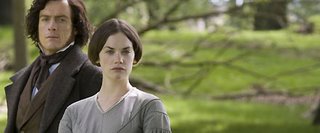 The Independent
The Independent publishes an article about the
upcoming BBC Jane Eyre. The journalist visited the production in Haddon Hall and seems a little obsessed with the female response to Rochester and Toby Stephens.
I'm on the set of Jane Eyre in an appropriately atmospheric part of the Peak District. The shoot is based near Matlock at Haddon Hall, which Simon Jenkins called "the most perfect house to survive from the Middle Ages" in 1,000 Best Houses.
Susanna White, the director responsible for last year's excellent dramatisation of Bleak House, smiles mischievously as she reveals her hope that her Mr Rochester can have a comparable impact to another small-screen portrayal of a troubled hero from 19th-century literature, Mr Darcy from Jane Austen's Pride and Prejudice.
"I hope Toby will have 'the Colin Firth Effect'," she beams. "I hope he'll be a huge heart-throb. When he's in those riding boots, that's a great look. Women on the set have been drooling, and I hope women on their settees at home will be, too."
The director goes on to explain why women have always been drawn to the figure of Mr Rochester. "He's a troubled man, and, ultimately, he chooses a plain girl because he values substance over style. It's the classic story of a woman who tries to sort out a complicated man."
Diederick Santer, the producer behind last year's successful modern-day adaptations of Much Ado About Nothing and The Taming of the Shrew, agrees that the figure of Mr Rochester exerts a rare power on the public imagination. "He's every woman's fantasy man. He has a threatening past and seems untameable, but, in the end, is tamed by a girl who makes his pain go away."
This insistence on Rochester's (and Toby's) charms is somewhat tiresome. We realize that the prime target of Jane Eyre are women... but it is not necessary to insist on it time and time again.
Fortunately, Susanna White manages to steer away from the subject:
So the producers were well aware of the danger of "Eyre overkill". White concedes that "at first, I thought to myself, 'What can I do to make Jane Eyre fresh?' But once I started working on it, I realised every generation needs its own version of the story."
White is keen to underline the universality of this turbulent love story. "For me," the director observes, "there is no distance between these characters and us. It's not a tale about remote people in corsets who you can't relate to. It's a readily identifiable story about living people with genuine feelings."
Wilson also highlights Jane's modernity. "She is a modern, incredibly strong and independent heroine," says the actress. "She is a character with issues everyone can relate to. It's a story of the first love of a girl who's really suffered. Jane's an orphan who had an horrific upbringing. Her circumstances have meant she has always had to suppress her desires. Then, she is liberated by this mysterious, brooding, seemingly quite cruel man."
Wilson carries on by outlining why audiences are so compelled by the relationship between Mr Rochester and Jane. "Throughout the first half, they never tell each other what they're really thinking. Everyone has been in those sort of relationships. Jane and Rochester spend so much time dancing round each other without expressing their true feelings," she says, before laughing. "Isn't that so modern?"
Categories: Movies-DVD-TV, Jane_Eyre









0 comments:
Post a Comment